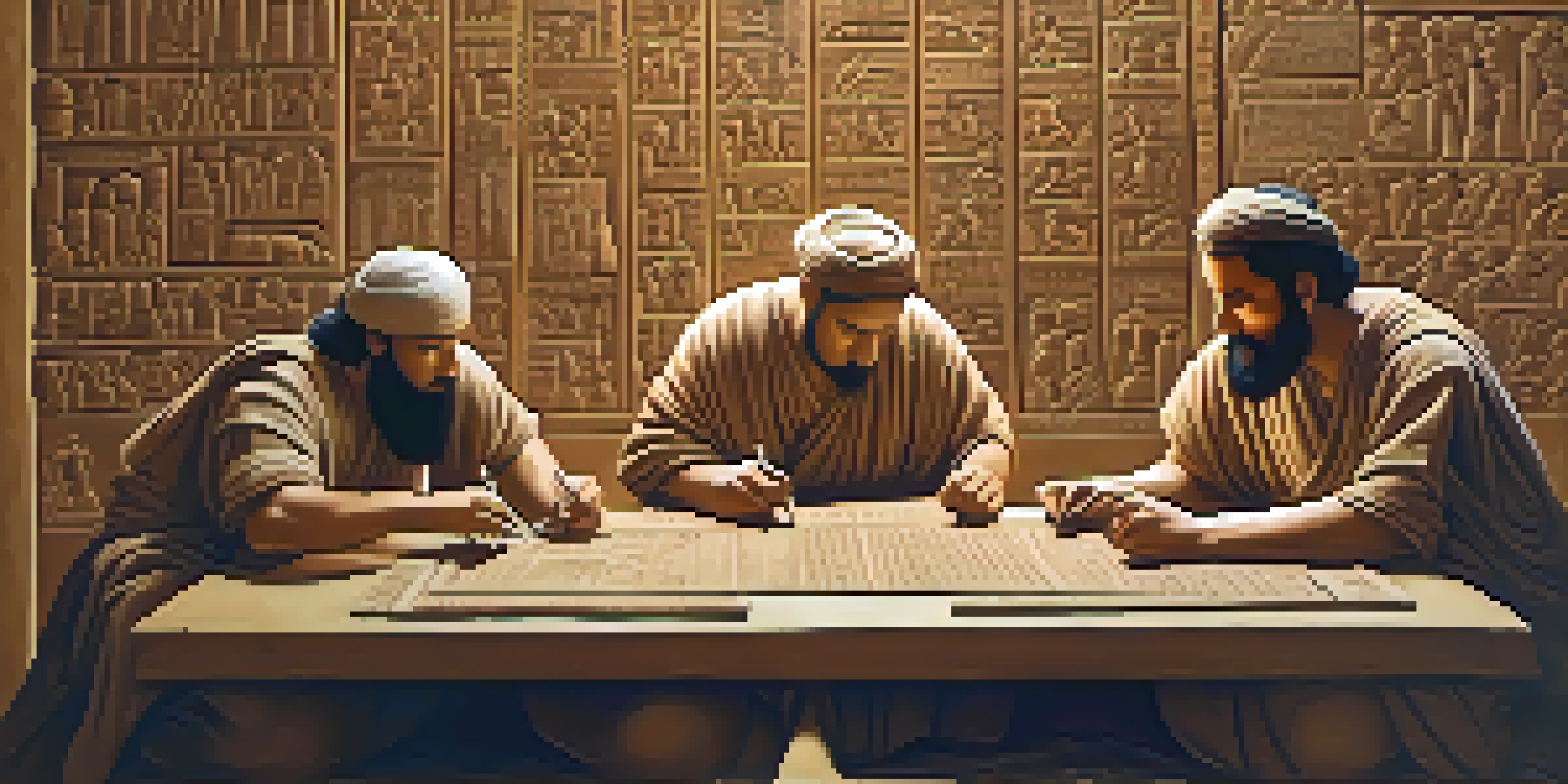The Evolution of Historical Writing: A Timeline Review

Ancient Beginnings: The Dawn of Historical Narratives
Historical writing has its roots in ancient civilizations, where storytelling was a key method for preserving knowledge. The Sumerians, for example, utilized cuneiform to record events on clay tablets. This early form of writing laid the foundation for documenting history, as it allowed for the recording of significant events and the lives of rulers.
History is not a burden on the memory but an illumination of the soul.
As societies evolved, so did the style of historical narratives. The Egyptians and Greeks began using hieroglyphs and prose to create more elaborate accounts of their histories. Notable figures like Herodotus, often called the 'Father of History,' emerged during this time, emphasizing the importance of inquiry and evidence in historical writing.
These ancient texts were not just records; they were also reflections of cultural values, beliefs, and identities. They set the stage for future historians, highlighting the human desire to understand and learn from the past.
Medieval Chronicles: History Through a Religious Lens
During the medieval period, historical writing became heavily influenced by religion. Monasteries played a crucial role in preserving knowledge, as monks meticulously copied texts and chronicled events through a theological lens. This often meant that history was intertwined with biblical narratives and moral lessons.

Chronicles from this era, such as those by Bede, focused on the deeds of saints and the divine right of kings. This perspective not only documented the past but also sought to teach lessons about faith and morality. Historical accuracy sometimes took a backseat to spiritual significance.
Historical Writing's Evolution
Historical writing has transformed from ancient narratives focused on rulers to contemporary accounts that include diverse perspectives and methodologies.
The influence of religion on historical writing during medieval times illustrates how context shapes narratives. These chronicles provided a sense of continuity and identity, linking the present with a divine purpose rooted in the past.
Renaissance Humanism: A Shift Towards Secular History
The Renaissance marked a significant shift in historical writing, as humanism emerged, emphasizing human experience and reason. Historians began to seek out primary sources and focus on secular events rather than solely religious themes. This transformative approach encouraged a more critical analysis of historical texts.
We are not makers of history. We are made by history.
Figures like Francesco Guicciardini and Niccolò Machiavelli championed the idea that history could provide lessons for political governance. Their works encouraged readers to reflect on human behavior and the complexities of power, moving away from purely moralistic interpretations.
This period of enlightenment led to a richer, more nuanced understanding of history, setting the stage for future historians to explore the intricacies of human experience. The shift towards secularism in historical writing opened the door for diverse perspectives and methodologies.
The Enlightenment: Rationality and Empirical Evidence in History
The Enlightenment brought a wave of rational thought and empirical evidence to historical writing. Historians like Edward Gibbon applied rigorous standards of evidence, seeking to understand the causes and effects of events. This period emphasized the importance of reason and observation in interpreting history.
Gibbon's work, 'The History of the Decline and Fall of the Roman Empire,' exemplified this approach, as he critically analyzed the factors that led to the empire's downfall. His methodology encouraged historians to base their narratives on evidence rather than tradition or speculation.
Impact of Religion on History
During the medieval period, historical narratives were largely shaped by religious beliefs, intertwining events with moral and theological lessons.
The Enlightenment's impact on historical writing was profound, fostering a sense of critical inquiry that would influence future scholars. It laid the groundwork for modern historiography, where the objective analysis of sources became paramount.
19th Century Narratives: Nationalism and Historical Identity
The 19th century witnessed the rise of nationalism, which significantly influenced historical writing. Historians began to frame narratives around national identities, emphasizing the unique stories of nations and their peoples. This shift often aimed to foster a sense of unity and pride among citizens.
Figures like Jules Michelet and Leopold von Ranke emphasized the importance of national histories, presenting the past as a series of events that shaped the identity of a nation. This approach sometimes led to a glorification of the nation's heroes while downplaying or ignoring darker aspects of history.
The intertwining of history and nationalism during this period highlighted how narratives could be shaped to serve political ends. This evolution in historical writing reflected the growing importance of national identity in the modern world.
20th Century Perspectives: Diverse Voices and Methodologies
The 20th century brought about a diversification of historical voices and methodologies. Historians began to recognize the importance of including marginalized perspectives, leading to a broader understanding of history. This shift was marked by the rise of social history, which focused on the experiences of everyday people.
Prominent historians like Howard Zinn challenged traditional narratives by highlighting the struggles of those often left out of mainstream accounts. This approach emphasized that history is not just about great leaders but also about the collective experiences of various groups.
Future of History in a Digital Age
The future of historical writing promises innovations through technology and interdisciplinary approaches, enhancing accessibility and inclusivity in storytelling.
As historiography evolved, new methodologies emerged, such as feminist history and postcolonial theory, challenging existing narratives and broadening the scope of historical inquiry. This era underscored that history is a dynamic field shaped by diverse perspectives.
Contemporary History: Digital Age and Global Perspectives
In the contemporary era, historical writing has entered a digital age, transforming how we access and interpret the past. The internet has made vast amounts of historical data available, allowing historians and the public to engage with history in unprecedented ways. Digital archives and online resources have democratized access to historical documents.
Moreover, globalization has led to a more interconnected understanding of history. Historians are now more aware of how events in one part of the world can influence and shape narratives in another. This global perspective enriches our understanding of history by highlighting interconnectedness.

As we move forward, contemporary historians continue to grapple with the challenges and opportunities presented by technology and globalization. The evolution of historical writing reflects our ongoing quest to understand the complexities of human experiences across time and space.
Looking Ahead: The Future of Historical Writing
As we look to the future, the evolution of historical writing suggests exciting possibilities. With advancements in technology, historians can explore new methods of storytelling, such as interactive timelines and immersive experiences. These innovations could engage broader audiences and make history more accessible.
Additionally, the increasing emphasis on interdisciplinary approaches invites collaboration with fields like anthropology, sociology, and digital humanities. This cross-pollination of ideas can lead to richer, more nuanced narratives that reflect the complexity of human experiences.
Ultimately, the future of historical writing will likely continue to prioritize inclusivity and diverse perspectives. By embracing new technologies and methodologies, historians can ensure that the stories of all people are told, fostering a deeper understanding of our shared past.